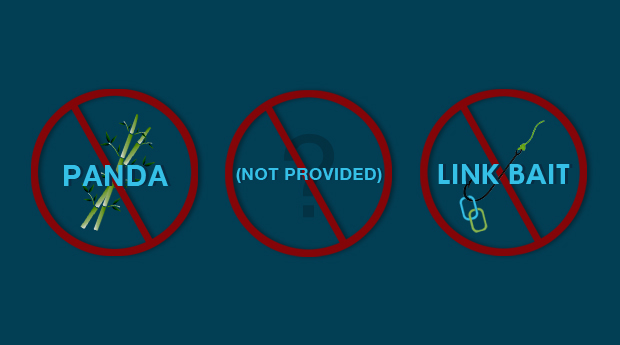10 SEO Words to Ban Forever
SEO has evolved quite a bit over the past decade, but its evolution over the past two years has been especially frenetic and dramatic. Luckily for us, we were never a digital agency that relied solely on template tactics or cookie-cutter strategies. Our SEO team has always focused on increasing visibility across the digital ecosystem, enhancing brand recognition, and creating and optimizing content for the audience rather than the search engines.
We’ve been criticized for this in the past. Why do things the hard way? How do you sit back and watch your competitors win using these shameless tactics? Well, for two simple reasons. First, we’re a human centered agency (see our previous post on this), and trying to manipulate the search engines without regard to user intent goes directly against our purpose and the expressed purpose of the search engines.
Secondly, we’re humble enough to realize that Google, Bing, and any other search engine that comes along will overcome any shortcuts SEO firms invent. They have some really smart people working for them that excel at sniffing out trickery, because their collective goal is true relevance. No shortcuts, no manipulation, just relevance.
That said, we have a simple rule that guides all things SEO in our office – “If you wouldn’t do it offline, don’t do it online.” The digital world is simply an online reflection of offline human behaviors, and the goal of any search engine is to reflect that behavior in their results.
So, for the betterment of our industry, I’d like to propose we ban the following 10 words (and phrases) from this day forward:
1. Link bait – While the original concept behind the term wasn’t inherently evil, what an awful term this is. Bait implies tricking. Bait implies it’s not going to be valuable for the user. Bait implies an attempt to abuse the unconscious for personal gain. Besides, the language of links is nearly dead. Create great content along with a strong awareness and promotion plan and good things will happen.
2. Link juice – The idea behind the phrase is still relevant, but the words "link juice" just sound gross, don't they? There are better ways to communicate this concept. Try using "link value" instead. If you create great content that others pick up, or if a contextually relevant site links to you naturally (with the incentive of great destination content), then all of your SEO efforts will fall into place. Talk about links in terms of strength and value, and leave the juice in your fridge.
3. Link building – The time has come for us to move past “building” links and toward growing or nurturing them through honest, legitimate interaction. The concept of “link building” for SEO purposes violates our golden SEO rule above. Create great content that services the needs of your audience, then create awareness and distribution strategies that seed the digital ecosystem. Take feedback from the audience, optimize, and repeat. Link building in traditional terms implies creating tactical, short-term plans to manipulate the search engines. The future involves building and leveraging your community and creating your marketing materials based on them, not the search engines.
4. Infographics – These are meant to be graphics that convey difficult or abstract data in a new way. An infographic is not a picture. An infographic is not a re-print of data using colored fonts. An infographic is a visual representation of data meant to help the user decipher that data. Not to sound like a broken record, but think great content. If data visualization fits into the strategy, then pursue that strategy! If not, please don’t use the word – even Matt Cutts is warning about this in his recent interview with Eric Enge.
5. PageRank – The problem isn’t the term itself, but the religious watching of PageRank and the desire to improve it regardless of how your more actionable metrics are impacted. PageRank isn’t a goal, it’s an indicator (and not a great one, at that). If you’re looking for metrics to include in reporting, focus on something that more closely correlates with an improvement in your overall business goals. If you’re still obsessed with off-page strength, use MozRank – as an indicator, it’s decidedly more telling and accurate.
6. (Not Provided) – Not that we need to stop talking about it, but we need to stop complaining about it. It's here and it's not going anywhere, so don't complain about wanting it back. Find ways to extrapolate this data, such as using Webmaster Tools and the Google Analytics Content report, and develop your strategies accordingly.
7. Meta keywords - Just. stop. talking. about. these.
8. Panda - It happened. We all know about it. If a client doesn't know about it, quite frankly they don't give a shit. Google makes upwards of 500-600 algorithm updates every year and will continue to iterate on this particular update as it finds new ways to improve. Let's move on.
9. Yahoo! – No one really misses this old friend, but reporting on or discussing Yahoo! rankings is silly given the Yahoo!/Bing marriage.
10. SEO is Dead – We’ve all heard this one. As long as people use search engines and there are natural results within them, SEO won’t die. What people mistake for dying is simply change or the evolution of SEO. Even Forbes posted an article on this topic last week, but the author somehow failed to realize that he wasn’t describing the death of SEO (meaning organizations wouldn’t, or couldn’t, optimize their sites for better results), but rather a more brand and PR focused approach spanning the digital ecosystem in a way that engages the intended audience.
I’m sure there will be many opinions on this subject, so please comment below if you disagree with any of the phrases on the list, or feel I left some out.
Despite our recent post on the SEO Mind, and my list above, SEO has consistently proven to be the single most efficient marketing instrument when compared to all other mediums. However, it’s quite fun to point out some of the absurdities in the language and thought patterns of our peers.


Comments
Add A CommentJohn - They don't say to stop using meta tags, only meta keywords.
I disagree with a few of these; Panda was great if you were doing SEO the right ways, so it is good to tell clients why they should do things right.
One I would add is Pageviews. What really matters is goal conversion or ad clicks and to get those better, you need the right kind of pageviews - more pageviews don't always lead to more success.
Why forget about meta tags?. Yes, you are write content is king. But what about back links?
Yeah, we definitely need to update the SEO lexicon. The media and spammers out there have given the industry a bad enough reputation over the years. Hopefully the media-hyped Panda and Penguin updates and JC Penney-type horror stories will serve to better educate our clients and help them discern the quality providers from the sketchy ones.
Cool story bro
I couldn't agree more. The one thing I've told anyone I've ever worked with is to write quality content for the people. It may take longer to create and longer to gestate, but once it does it isn't going anywhere. They call that relevance, not magic.